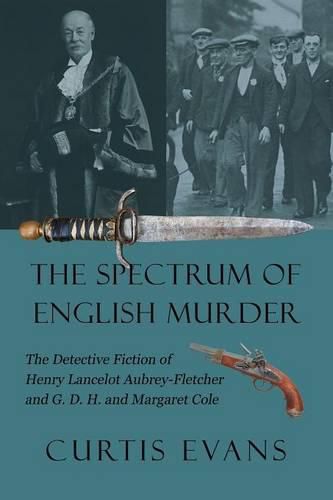Readings Newsletter
Become a Readings Member to make your shopping experience even easier.
Sign in or sign up for free!
You’re not far away from qualifying for FREE standard shipping within Australia
You’ve qualified for FREE standard shipping within Australia
The cart is loading…






This title is printed to order. This book may have been self-published. If so, we cannot guarantee the quality of the content. In the main most books will have gone through the editing process however some may not. We therefore suggest that you be aware of this before ordering this book. If in doubt check either the author or publisher’s details as we are unable to accept any returns unless they are faulty. Please contact us if you have any questions.
That British mysteries from the Golden Age of detective fiction (customarily defined as the period between the First and Second World Wars) were not only aesthetically but ideologically conservative has long been a commonplace of mystery genre criticism. In The Spectrum of English Murder, Curtis Evans challenges this view by looking at the detective fiction of Henry Lancelot Aubrey-Fletcher and G. D. H. and Margaret Cole, a trio of popular British crime writers from the Golden Age. Although Aubrey-Fletcher, a Great War veteran and member of his country’s traditional gentry elite, and the Coles, prominent socialist intellectuals, wrote about fictional murder from polar points of the political spectrum, the detective fiction of all three authors is alike in that it often defies conventional expectations of between-the-wars British mystery writing. Aubrey-Fletcher’s detective fiction, published between 1926 and 1957 under the pseudonym Henry Wade, offers searching and sometimes searing criticism of myriad aspects of English society. A pioneer of both the police procedural and the crime novel, Aubrey-Fletcher was an important figure in the movement to transform the classical tale of detection. As a sideline from their serious writing on politics and economics, the Coles between 1923 and 1946 produced a significant body of detective fiction, much of it mocking cherished conservative values. Although less formally innovative in their mystery writing than Aubrey-Fletcher, the husband and wife were exceptional within the genre at this time for their employment of leftist-tinged satire and farce. The Spectrum of English Murder offers both fans and scholars of Golden Age detective fiction an entertaining and illuminating analysis of the works of three of the period’s most interesting crime writers, all of whom merit modern-day revival.
$9.00 standard shipping within Australia
FREE standard shipping within Australia for orders over $100.00
Express & International shipping calculated at checkout
This title is printed to order. This book may have been self-published. If so, we cannot guarantee the quality of the content. In the main most books will have gone through the editing process however some may not. We therefore suggest that you be aware of this before ordering this book. If in doubt check either the author or publisher’s details as we are unable to accept any returns unless they are faulty. Please contact us if you have any questions.
That British mysteries from the Golden Age of detective fiction (customarily defined as the period between the First and Second World Wars) were not only aesthetically but ideologically conservative has long been a commonplace of mystery genre criticism. In The Spectrum of English Murder, Curtis Evans challenges this view by looking at the detective fiction of Henry Lancelot Aubrey-Fletcher and G. D. H. and Margaret Cole, a trio of popular British crime writers from the Golden Age. Although Aubrey-Fletcher, a Great War veteran and member of his country’s traditional gentry elite, and the Coles, prominent socialist intellectuals, wrote about fictional murder from polar points of the political spectrum, the detective fiction of all three authors is alike in that it often defies conventional expectations of between-the-wars British mystery writing. Aubrey-Fletcher’s detective fiction, published between 1926 and 1957 under the pseudonym Henry Wade, offers searching and sometimes searing criticism of myriad aspects of English society. A pioneer of both the police procedural and the crime novel, Aubrey-Fletcher was an important figure in the movement to transform the classical tale of detection. As a sideline from their serious writing on politics and economics, the Coles between 1923 and 1946 produced a significant body of detective fiction, much of it mocking cherished conservative values. Although less formally innovative in their mystery writing than Aubrey-Fletcher, the husband and wife were exceptional within the genre at this time for their employment of leftist-tinged satire and farce. The Spectrum of English Murder offers both fans and scholars of Golden Age detective fiction an entertaining and illuminating analysis of the works of three of the period’s most interesting crime writers, all of whom merit modern-day revival.